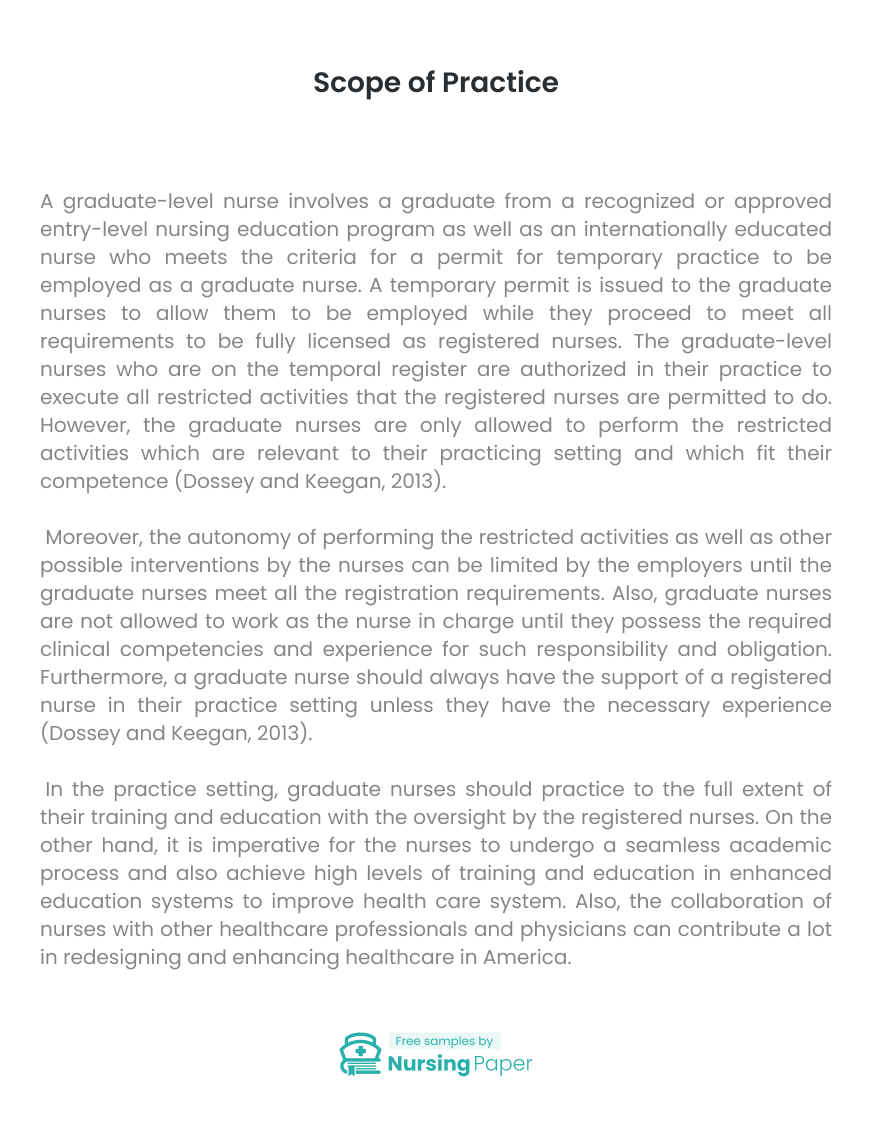
Introduction
A graduate-level nurse involves a graduate from a recognized or approved entry-level nursing education program as well as an internationally educated nurse who meets the criteria for a permit for temporary practice to be employed as a graduate nurse. A temporary permit is issued to the graduate nurses to allow them to be employed while they proceed to meet all requirements to be fully licensed as registered nurses. The graduate-level nurses who are on the temporal register are authorized in their practice to execute all restricted activities that the registered nurses are permitted to do. However, the graduate nurses are only allowed to perform the restricted activities which are relevant to their practicing setting and which fit their competence (Dossey and Keegan, 2013).
Moreover, the autonomy of performing the restricted activities as well as other possible interventions by the nurses can be limited by the employers until the graduate nurses meet all the registration requirements. Also, graduate nurses are not allowed to work as the nurse in charge until they possess the required clinical competencies and experience for such responsibility and obligation. Furthermore, a graduate nurse should always have the support of a registered nurse in their practice setting unless they have the necessary experience (Dossey and Keegan, 2013).


Conclusion
In the practice setting, graduate nurses should practice to the full extent of their training and education with the oversight by the registered nurses. On the other hand, it is imperative for the nurses to undergo a seamless academic process and also achieve high levels of training and education in enhanced education systems to improve health care system. Also, the collaboration of nurses with other healthcare professionals and physicians can contribute a lot in redesigning and enhancing healthcare in America. Through enhanced information infrastructure as well as a proper collection of data will help in establishing an effective planning of the workforce and develop suitable policies in health care (Institute of Medicine and Robert Wood Johnson Foundation, 2011).
1. Dossey, B. M., & Keegan, L. (2013). Holistic nursing: A handbook for practice. Burlington, MA: Jones & Bartlett Learning.
2. Institute of Medicine (U.S.)., & Robert Wood Johnson Foundation. (2011). The future of nursing: Leading change, advancing health. Washington, D.C: National Academies Press.



The download will start shortly.

The download will start shortly.
 Subject:
Medicine
Subject:
Medicine  Number of pages: 3
Number of pages: 3  Subject:
Medicine
Subject:
Medicine  Number of pages: 9
Number of pages: 9  Subject:
Nursing
Subject:
Nursing  Number of pages: 11
Number of pages: 11  Subject:
Health and Social Care
Subject:
Health and Social Care  Number of pages: 20
Number of pages: 20  Subject:
Nursing
Subject:
Nursing  Number of pages: 3
Number of pages: 3  Subject:
Nursing
Subject:
Nursing  Number of pages: 8
Number of pages: 8  Subject:
Health and Social Care
Subject:
Health and Social Care  Number of pages: 9
Number of pages: 9  Subject:
Health and Social Care
Subject:
Health and Social Care  Number of pages: 6
Number of pages: 6  Subject:
Medicine
Subject:
Medicine  Number of pages: 3
Number of pages: 3  Subject:
Medicine
Subject:
Medicine  Number of pages: 4
Number of pages: 4  Subject:
Nursing
Subject:
Nursing  Number of pages: 16
Number of pages: 16  Subject:
Health and Social Care
Subject:
Health and Social Care  Number of pages: 7
Number of pages: 7  Subject:
Nursing
Subject:
Nursing  Number of pages: 22
Number of pages: 22  Subject:
Nursing
Subject:
Nursing  Number of pages: 9
Number of pages: 9  Subject:
Nursing
Subject:
Nursing  Number of pages: 3
Number of pages: 3 
